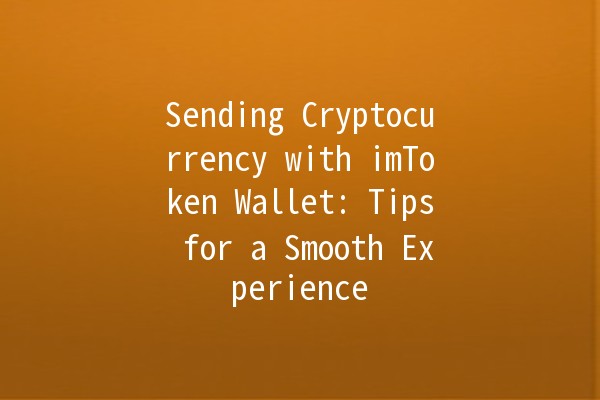imToken is one of the leading cryptocurrency wallets available today. It allows users to store, manage, and send a vast variety of digital currencies with ease. One of the most frequently used features of this wallet is sending cryptocurrency, which can sometimes be a bit daunting, especially for new users. This article will provide practical tips to enhance your productivity when sending cryptocurrencies using imToken.
Before diving into the tips, it’s essential to understand what sending cryptocurrency entails. When you send digital coins, you are transferring ownership from one wallet address to another. Each transaction is recorded on the blockchain, making it secure and nearly impossible to reverse. This process involves gas fees, which are the transaction costs on the network, and these fees can vary depending on network traffic.
Before initiating a transaction, always doublecheck your balance. Ensure you have enough cryptocurrency not only to send but also to cover the gas fees required for the transaction. Gas fees vary depending on network congestion; if it’s busy, fees might increase.
For instance, if you want to send 0.5 ETH, ensure you also have enough ETH in your wallet to cover the gas fees, which may vary between $1 and $10 depending on the current network conditions. If your account only has 0.5 ETH, the transaction will fail due to insufficient balance for gas fees.

A common mistake when sending cryptocurrency is inputting the wrong wallet address. Cryptocurrency transactions are irreversible; if you send coins to the wrong address, retrieving them can be extremely difficult.
Always copy and paste the recipient's wallet address to avoid mistakes. If you’re using QR codes, ensure the scanning was successful and the wallet address matches the intended recipient. Take the additional step to verify the last few characters of the address with the sender before completing the transaction.
Transaction notes are an underutilized feature in many wallets, including imToken. Adding a note during a transaction can help clarify the purpose and details of the transfer.
For example, if you are sending funds to a friend for dinner, writing “Payment for dinner at XYZ Restaurant” in the transaction note can help both you and the recipient keep track of the transaction’s purpose. This is particularly useful for managing personal finances or bookkeeping.
The state of the network can significantly affect transaction times and fees. Monitoring network conditions can help you decide when to send or hold off your transaction for better fees.
Use tools like Ethereum Gas Station or Freewallet to check the current gas prices and expected transaction times. If the network is congested, you might choose to wait a few hours to save on gas fees. On the other hand, during offpeak times, sending your cryptocurrency could be cheaper and faster.
Security is paramount when dealing with cryptocurrencies. Enabling twofactor authentication (2FA) adds a layer of protection to your account, ensuring that even if someone gains access to your password, they cannot easily access your wallet.
If you use SMS or an authenticator app for 2FA, always make sure that you can access the second method to complete the login process. This extra step will protect you from unauthorized transactions and potential losses.
If you send cryptocurrency to the wrong address, recovery is typically not possible since transactions on the blockchain are irreversible. However, there are a few options. If the address belongs to a wallet service (like an exchange), you can reach out to their support team, providing transaction details, as they may be able to assist in certain situations.
When sending cryptocurrency, you might encounter the following fees: network fees (or gas fees), which go to miners for processing the transaction, and transaction fees imposed by the cryptocurrency wallet you use. Make sure to review both before sending to understand the total cost involved.
Once a cryptocurrency transaction is initiated and confirmed on the network, it cannot be canceled. If the transaction is pending and not yet confirmed, you may be able to speed it up or drop it by adjusting the gas fee in some wallets. However, once it’s confirmed, it is no longer possible to reverse it.
The confirmation time for a cryptocurrency transaction can vary based on several factors, including network congestion and the gas fees you've selected. Generally, transactions can be confirmed anywhere from a few seconds to several minutes. Checking current network congestion can give you a better idea of expected times.
Sending large amounts of cryptocurrency using imToken can be safe as long as you take necessary precautions. Always confirm addresses, be aware of network conditions, and consider using the additional security features provided by the wallet, such as 2FA.
If your transaction is stuck pending, you may want to check the gas fees. You can either wait for the network to clear or try to speed up the transaction if your wallet allows it. If it remains stagnant for an extended period, it’s advisable to consult the wallet’s support page or community forums for assistance.
These tips aim to streamline the process of sending cryptocurrencies with the imToken wallet, helping users avoid common pitfalls and enhance their overall experience. By taking these factors into account, anyone can confidently send digital currencies while ensuring their transactions are smooth and efficient.